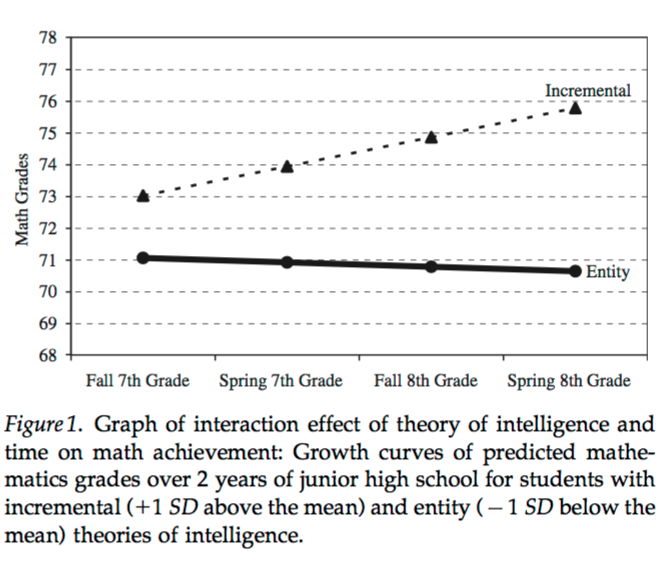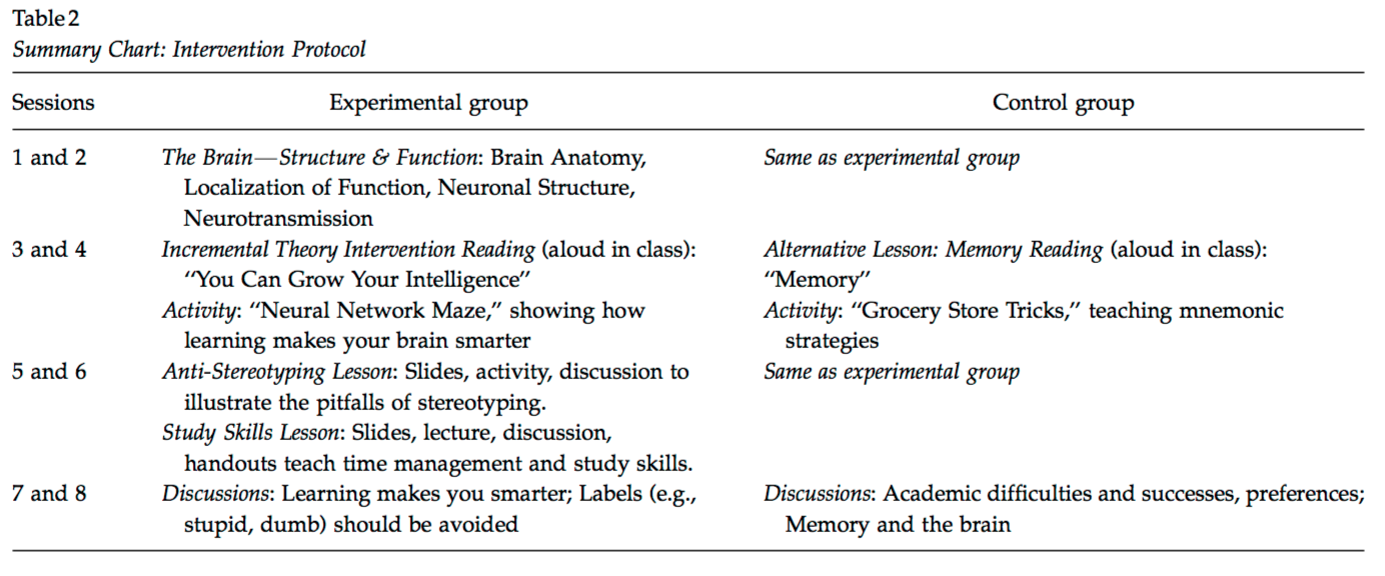Written by Cindy Hovington, Ph.d. Founder of www.curiousneuron.com.
Your attitude has an influence on your effort. Teachers see it everyday in their classroom. “Student A” gets 65% on a math test and says, “I will never be good in math. I was born dumb in math!”. “Student B” gets 65% on a math test and says, “I thought I studied well for this test, maybe I missed something.” and asks their teacher to explain their mistakes. Both these students have different “attitudes” towards failure. As a result of their attitudes, they will study differently and this will pave the path for either success of failure.
Which attitude does “Student A” have?
Entity attitude. A student with this type of attitude believes that they were born either “smart” or “not smart”, and that it is fixed. These types of students do not respond well to errors. They need extra guidance and support to boost their motivation both in and out of the classroom. Even if they think they were born smart, they will not make an effort to do better. Teachers might struggle to get this type of student to go the “extra mile”. The student who thinks they were born “not smart” might also have negative inner self-talk or exam anxiety. They might need more positive feedback on assignments and exams.
Which attitude does “Student B” have?
Figure 1.
Incremental attitide. As Dr. Carol Dweck describes in her book Mindset, a student with incremental attitude, or a “growth mindset”, believes they can get more intelligent with effort and that their intelligence is not fixed. It is this type of student that will put in the time and effort and will also have greater success than the student with an entity attitude. As you can see in this graph from one of Dr. Dweck’s studies, incremental improvements in math grades can be seen in students with an incremental attitude.
Science behind motivation and achievement in a nutshell.
Motivation is a complex subject in neuroscience. Motivation recruits brain areas involved in both emotions (limbic system) and thinking/ cognition (frontal lobe).This is why it has a great impact on student learning. Scientists are beginning to get a better understanding of the relationship between emotions, cognition and motivation. An article by Crocker et al. (2013) beautifully outlines this relationship in greater detail for those of you who are interested. In addition, studies have shown that a person places greater effort when they anticipate a positive outcome. If a student begins to anticipate a low grade on a test, especially while studying or writing a test, their effort will most likely be lower, which will in turn impact their level of thinking. Stay tuned for a future article on motivation, make sure your subscribe to our mailing list at the bottom of the page.
My advice: Bring these attitudes into a students awareness.
>
““As students learn, these experiences shape the architecture of their brains. Therefore, abilities are not fixed but rather continuously developing. This plasticity enables students to overcome many learning challenges. ”
”
My experience with students has taught me that learning about their brain empowers them, regardless of their age. Learning that the brain is plastic (able to change its architecture through learning) is fascinating to students. One of my favourite quotes from Dr. Fischer, a world class researcher who used to be the Director of the Mind, Brain and Education department at Harvard University, is that as we learn, the architecture of our brain changes (see full quote).
In the Blackwell study (2007), they studied 7th graders and followed them for a period of 2 years to assess their “attitudes”. Students who believed their intelligence is malleable (incremental attitude) had a steady increase in math grades over this 2 year period, whereas students who believed that intelligence if fixed had a slow decrease in math grades (see Figure 1 above). More importantly, researchers examined whether teaching students about these attitudes and how their brain functions could change their way of thinking. See figure 2 for details of the intervention. Indeed, this intervention promoted positive change in student attitude and motivation, strengthening the fact that we can change a students attitude.
Figure 2.
Classroom Application.
Challenge your students to build something. For instance, give your students toothpicks and mini marshmallows and ask them (either individual or small groups) to build the tallest possible tower. However, set some sort of limit that will make it challenging and almost “impossible”. For instance, ask them to build a tower that reaches a 4 foot mark (place some tape on the wall) and give them only 15 min. Within a few minutes you will start hearing them say, “THIS IS IMPOSSIBLE” or “I CAN’T DO THIS”. Perfect, the activity worked!. Don’t say a word!! After 15 min, hand out this worksheet or write out the questions on the board and discuss it with them (this worksheet might be more appropriate for younger students). How many gave up? What thoughts went through their mind? Did they change strategy? Go back to discuss the activity. Did you ever set limits for what materials they could use? No! Stack some books or bins on the floor near your 4 foot mark, and build the smallest structure with your toothpicks and marshmallows! VOILA! What is the take home message from this activity…YOUR MINDSET IMPACTS YOUR EFFORT!!!
This coming school year, start the discussion on mindset with your students or do this activity early on. Place this Poster of Growth Mindset Questions to Ask in your classroom. Be mindful of the students and their attitudes as this will guide you on how to support them. If you need advice on how to do this, feel free to email me!
We hope to see you on Social Media!







<p>Wonderful learning from your post. It has brought good information on the research of attitude and how to develop the attitude of students. Thank you.</p>
<p>Who is the author of this article?</p>